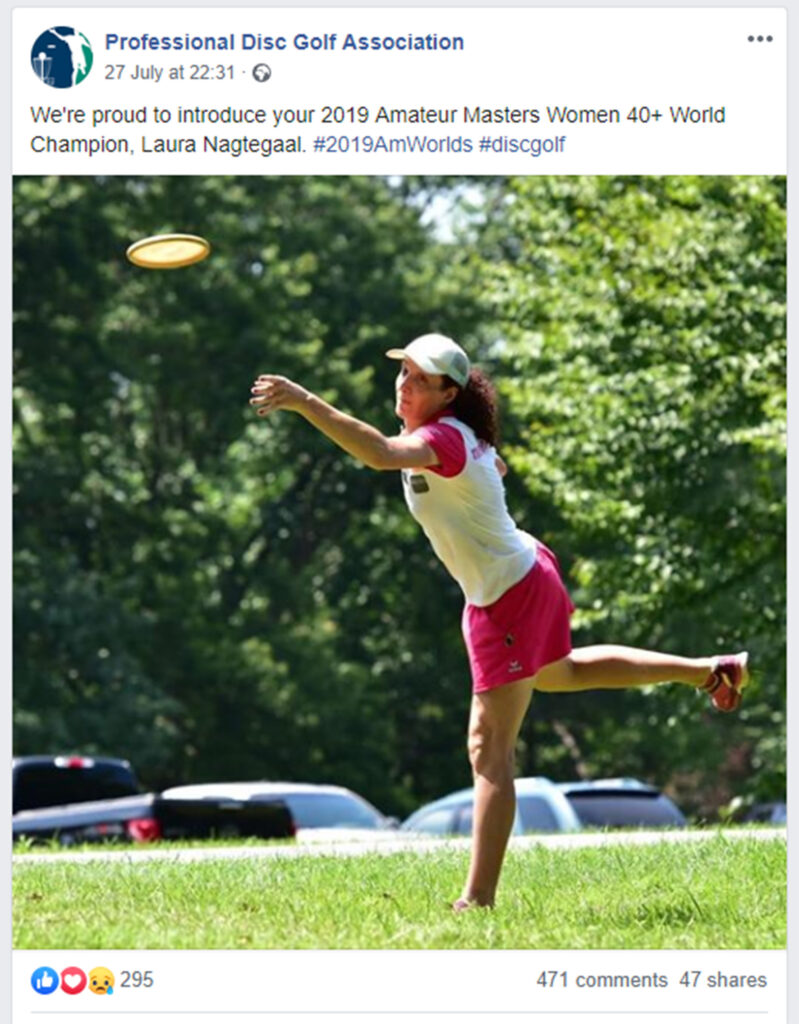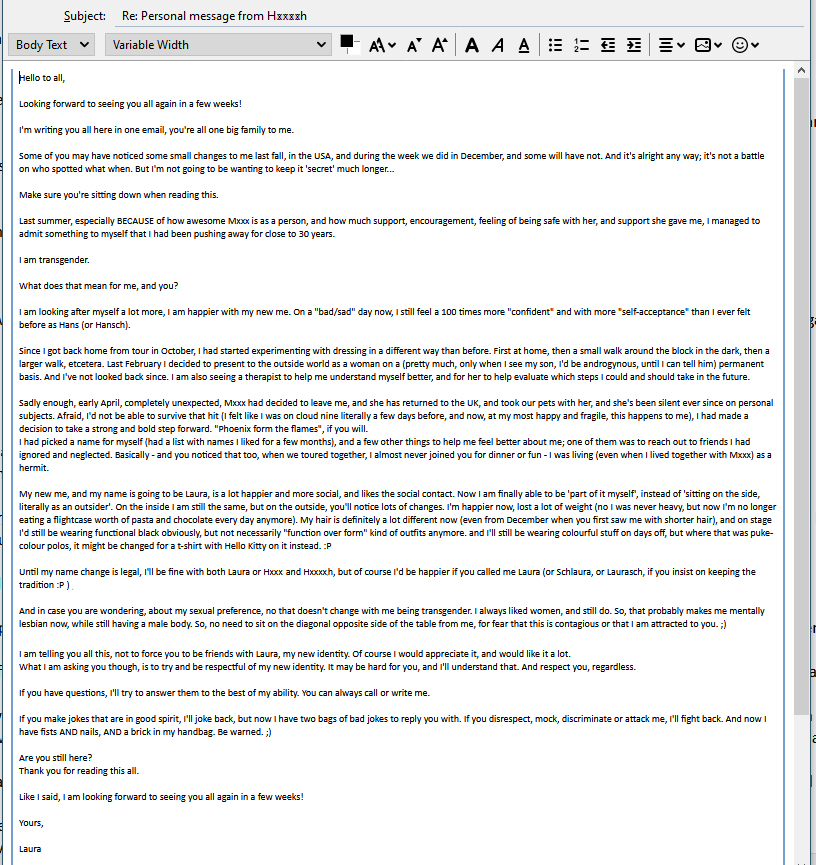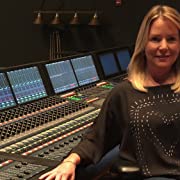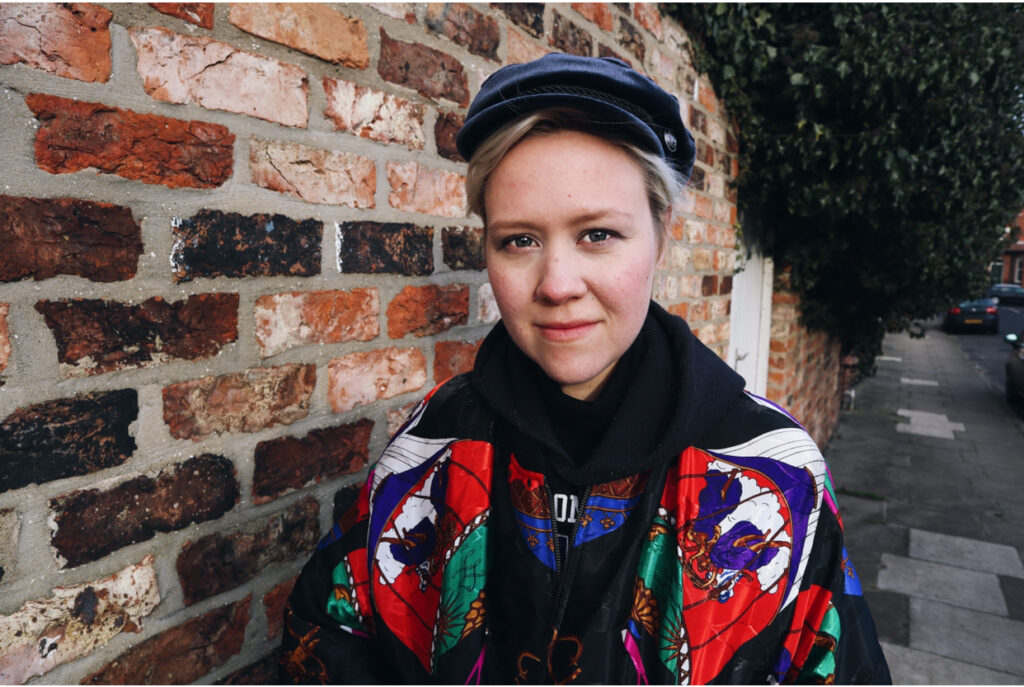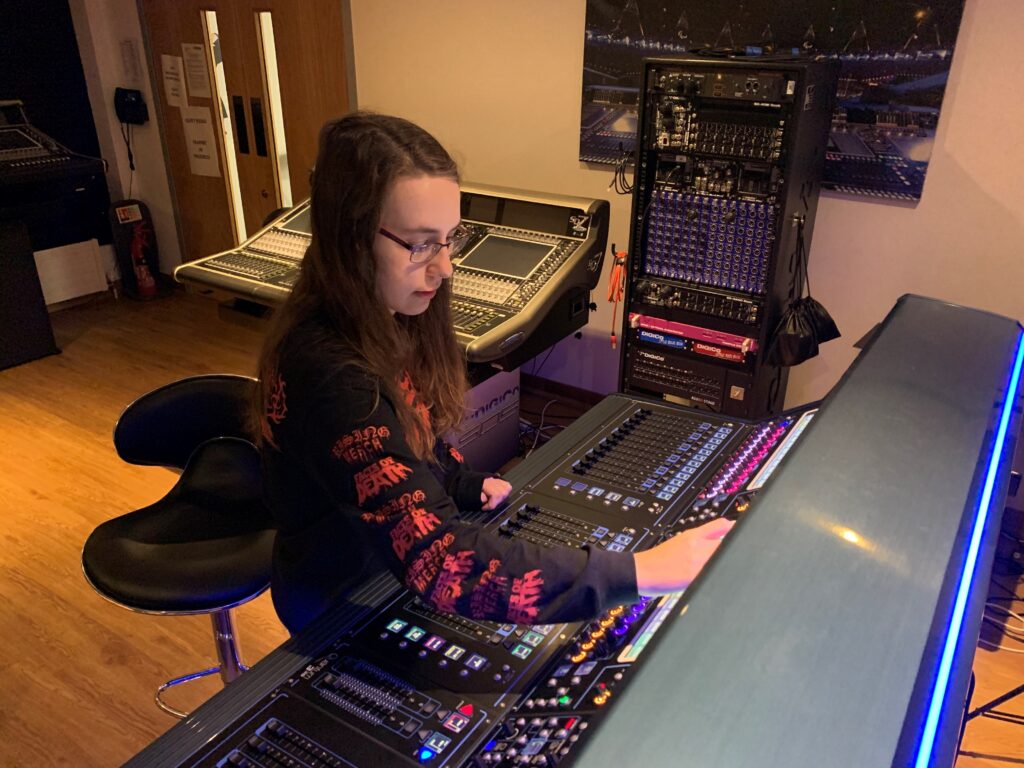Laura Nagtegaal is a transgender woman, fully transitioning in 2017. This is her experience working in the music industry.
Backline Tech Laura Nagtegaal has been working in Live Event Production since 1995. She started out doing merchandise and moved into working as a backline tech, stage manager and tour manager. She owns her own company surrealm.net and hails from the Netherlands. She has worked with acts such as Samael, Within Temptation, Porcupine Tree, Amon Amarth, Carcass, Triptykon, Blind Guardian, and Ayreon.
She fell in love with production when she was on a school performance night and had volunteered to push faders. A few years later, her mentor TM/FOH at the time for The Gathering Raymond Tabak encouraged her to combine her three passions into one “taking care of, music, and technique”. She got her start by hanging out at venues or with bands, eventually helping The Gathering with their internet presence, before there was such a thing. “We are talking Internet Stone Age here, I was setting up and maintaining their web presence in 1995, took over running the fan club at some point, and I started selling merch at their Dutch shows in 1996. That’s where it all went wrong (right) for me.”
Raymond Tabak would connect Laura with an up and coming Dutch band as their merchandiser and introduce her to a German tour manager, Jens “Bobo” Bornhöft who understood that she wanted to tour. Tabak encouraged Laura to be more assertive, but not cocky, to be confident about her skills. She took his words to heart when a few months later she heard that Samael would be touring and Bobo would be their tour manager cold calling Bobo and asked to be part of the crew. The interview was short “Can you tune guitars? Yeah, I can. I play bass. Okay, you’ve got yourself a tour.”
“I did my first tour as a guitar tech for Samael & Cathedral, and literally two weeks after that tour, I jumped on my next tour, selling merch for The Gathering, again with Bobo.
At that point, I pretty much knew, this was what I wanted to do, and didn’t look back. I have lived out of my suitcase or duffel bag since.”
Laura has had a long and exciting career following her passions, except she did all this with an identity that was not true to Laura, one that she was in deep denial about and kept closeted. While Laura knew at an early age that her gender assignment was wrong, she recalls she was between nine or eleven, she did not fully accept this until 2016.
SoundGirls sat down with Laura to discuss life on the road before and after transitioning, general advice for people in the industry and what we as a society and industry must do to move beyond gender.
What do you like best about touring?
The fact that I could be the silent force, supplying my service to the band, from an innate wish to provide my brand of “taking care of, music, and technique” sauce to their show and success, while remaining hidden, and in the background.
The camaraderie between crew members ( the Rocky theme tune starts playing in the back of my head), coming to great things because of synergy.
What do you like least?
Now that I have transitioned, I can finally pinpoint that –
The “while remaining hidden, and in the background” I just mentioned as something I cherished, don’t get me wrong though, it’s not that I want to be in the spotlight. No, it’s something deeper that that. In my being closeted, I was in deep denial about my identity, I hid, from myself, and the world. What better position to do so than in a hostile environment. It should come as no shock, that the live music industry can be a pretty harsh and sometimes straight-up “misogynist. And there I was, hiding”, like a sheep in wolves’ clothing, dressed in black, no name, no ego, no voice, no identity. Just a nameless unsung (I won’t use the word “hero” here) being doing their thing.
What is your favorite day off activity?
What I wish to have done more of, is to go and explore my surroundings with local friends. What I used to do was to basically hide in my comfort zone, whether that was my bunk, the back lounge, or my hotel room. In my denial, I didn’t really “grant myself permission to decompress”. Then I considered that to be a waste of energy, having to transition from “all work no play” to “free, myself”. Now I think I should add a deeper layer of “if I unwind too much, maybe my true self will come out, but I can’t let that happen”. For that same reason, I didn’t drink (I drink socially, about a glass a month now, because I like the taste), I didn’t do drugs, (still don’t, it just doesn’t appeal to me), and I just didn’t have fun. Remember that internet meme with grumpy cat? “I had fun once. I didn’t like it.” I devoutly lived by that. I flat-lined through my life & job.
What is your educational or training background?
I coasted through the highest level of high school (our middle school and beyond system is a tiered system based on IQ/aptitude) remarkably unchallenged and uninspired; by then, I had already started closeting myself and as a result, I went from being a very ambitious guy to a grey and uninspired mouse. I went to University and made two feeble attempts; first Computer Science, then Psychology, but did not actually study. I quit because I emigrated to Italy for love, but I think, in the end, that was just the easier way out. Now that I am fully transitioned, I regret having thrown away my opportunities there and then.
What are your long-term goals?
On a spiritual level, happiness through self-acceptance, and wisdom.
When did you first know your gender assignment was wrong?
I can’t really pinpoint it, but when I was about 9-11, I first did, and said, and dreamt things that I can now clearly define as me ‘knowing’ my gender assignment was wrong. A recurring dream/wish was waking up and finally having (or if that wasn’t in the cards, then at least for just a day) have a female body.
When did you fully accept this?
Not until the summer of 2016. I don’t remember the exact date anymore; I only know it was somewhere in the two-week period spent between Oulu (Finland), Pine Mountain, GA, home, and Tampa, FL. Tampa, FL was where we prepped for your five-week North American & Asian tour, and I kept to myself more than ever before.
On that tour, every day off was spent in solitude, trying to find second-hand stores and swapping out my duffel bag. A few days into that tour, at Cat’s Cradle (Carrboro, NC), we had Chinese food ordered in for dinner, and my fortune cookie said: “You need to live authentically, and you can’t ignore that.” No words ever rang truer.
When I finally got back home from Taiwan, mid-October, I hugged my fiancee, and together with her, started my transition.
How long did it take for you to decide to transition?
In what way? Between “knowing” and “accepting,” or between “accepting” and “doing”?
That first period lasted about 30 years; all that time, I sort of “knew,” but repressed it, I felt guilty towards life, like I was cheating on life by wanting to be different than what I was put on this earth as. And as a result, I censored myself to the extreme; flat-lining, apathy, all work no play, isolated, lethargic, passively self-destructive – All of those applied to me.
Between “accepting” and “doing,” there were either “a few days,” if you looked at when I walked into that department store and for the first time with ‘permission’ took something off the rack in the women’s department.
I got home from the tour about six weeks after having accepted myself, and in the next four months, I had experimented with style, clothes, confidence, before the two of us (my partner and I) went to Budapest for a weekend getaway, and me going to my first therapy session directly off the plane, on Valentine’s day. That day is officially considered the first day of my transition going full-time’, or as it’s officially called ‘real life experience’.
Was your partner supportive? Are you still together?
We are no longer together. A few weeks after Valentine’s day, she left. I am still grateful to her for having provided the safe space for me to finally accept myself. She was very supportive in my transition. But as a couple, I saw her pull away from us, from me, hard in the remaining five months after I got home form tour.
She has many friends who don’t identify as straight and/or cisgender, and with the amount of love and respect she showed when talking about them, I finally felt safe enough to face myself in the mirror, learn to accept myself, and tell her that I too am not cisgender. If she hadn’t been my partner, I probably would have self-combusted. In between the amount of self-restriction I imposed on myself, and my actual identity clashing with that more and more, and more extremely, I doubt I would have been able to repress my true self any longer.
With the acts and crews that you have worked with in the past, how did you tell them? What was their reaction?
For bands that I had started working prior to coming out, I had prepared an email that I would send to all musicians and crew, to prepare them. I used a fair amount of humour in explaining my transition, but the message itself was dead serious. The reactions were all remarkably positive; ranging from the fairly cool and business-like “I will support you 100%” to the warmest possible support.
Having worked for so many bands, with so many crews doing the same, working at festivals would promise to be an experience worth living. Those I worked for, of course ‘knew,’ but then the other bands and crew would show a mix of OMG!, WTF!, wow I’m so happy for you! you look great!, or simply not recognising me. I remember this festival in Milano (Italy) a few months after I had come out. The billing was five bands, and I travelled with the main act, Blind Guardian, double-dipped for two more (both of which I had sent that same email), and had worked for the other two in the past. That was quite the rollercoaster ride.
For the bands, you are still working with how have they acted or treated you since your transition?
I still work for Blind Guardian, but they’re in the studio now. Before we parted ways, for the time being, Andre, the guitar player I work, for told me he didn’t care what my name was, as long as I continued being his tech. Ayreon, whilst having remained connected to the main musicians since 2006/7 when they were in other bands, only became ‘my’ band after I transitioned. I’ve received a very warm welcome as Laura.
What if any obstacles or barriers have you faced? Before you transitioned and after?
Before I transitioned? Pretty much passively self-destructing. I would just go through life as uninspired and “un” as possible; flat-lining, and when I’d get close to feeling any kind of “happy.” I would prevent myself from getting there. I wasn’t “me,” so the being I “had to pretend to be,” wasn’t allowed to be happy in my stead.
Since my transition, I have met remarkably few barriers. I think that comes from my approach to life. I always had a positive and wholesome outlook on life, the universe, and all there is; karma, synchronicity, balance, juxtaposition within whilst opposing halves complement each other (yin-yang). Once I managed to accept myself for who and how I truly am, many things in my life just fell in place. Where many transgender people face anything from ridicule to violence up to being murdered, the most negative experience as a transgender woman I’ve had was while I pushed my gear on stage during a festival’s changeover, and a VIP pass owner threw a “you’re an ugly beard lady” at me.
How have you dealt with them?
Before transitioning? I didn’t. I just pretended I wasn’t ‘home’; I was all three of those monkeys, speak not, hear not, see not.
Since transitioning? I didn’t need to, except for in sports. I’m sure you are aware of the debate about “is a transgender woman allowed to play in gender protected divisions?” In the sport I have played since 2010, disc golf, I have – whilst also being a board member for the worldwide governing body – started being an advocate for that sport (and other sports as well) to adopt a more inclusive rules sets, whilst also keeping in mind ‘fair competition’. Until better and more studies have been done, the International Olympic Committee’s standards are “the fairest” (whilst still being far from perfect).
I have since, returned from Amateur Disc Golf World Championships, where I won the Women 40+ title, and that resulted in dozens of topics and memes on social media, over 3000 posts in total is my latest guesstimate, most of which were utterly hurtful and rife with accusations, and some crossed the border of harassment. The vast of these negative messages were made by angry men who – in an attempt to ‘protect the real women from people like me – did nothing more than actually doing a major disservice to women in sports by blatantly calling them the weaker half.I am not reporting any of the harassment, I want it to remain visible to the world, to see what transgender people deal with on a daily basis, And by doing so, I am trying to raise more awareness and visibility for LGBTQ+ (transgender in particular) people in sports, and be strong for those who are not (yet/anymore) strong enough to deal with the hatred themselves.
The advice you have for other women and young women who wish to enter the field?
Not anything that I would say only to women wishing to enter the field, I think.
Make sure you’ve got each other’s backs. Not just on stage, but off stage too. Your team is as strong as the weakest link.
Anyone wishing to enter this field should be aware of the highs and lows in this industry; it’s not all party and fun and sparkly. If you keep close to your true self, and keep in mind why you want to be in this field (“fame by association” doesn’t really apply in this field), you’ll find lots of ways and methods to look at yourself in the mirror at the end of the day and say: “You done good! I’m proud of you!”
Working in this field is an endless string of deadlines; you’ll feel and experience lots of highs as you keep meeting and beating those deadlines head-on. You’ll literally feel like you’re on top of the world. But if and when you fall off the bus, and those deadlines beat you, you could easily be spit out and left to rot by the side of the road as the bus continues. It’s a harsh reality, but it’s also a very honest one.
And those wise words that Raymond told me when I was a rookie, they’re still true today. “You need to be a bit more assertive. Not cocky, though. Be confident about your skills, but don’t make false promises.”
Especially to women, I want to say this. I am very aware of the steeper hill women need to climb in this field. Sexism in the workplace is a very ‘sad but true thing, and in the music industry, it is probably even more so. Things are changing for the better nowadays; not in the least by movements and initiatives like SoundGirls, and in Europe there are Women in Live Music. I see more artists nowadays that prefer a respectful and more diverse work environment. It’s not anywhere near the perfect situation yet, but the days where a woman on the tour bus was either “the girlfriend of” or, even more disrespectfully, “a groupie” have been left behind us.
Girl, when you’ve got the skills, flaunt them. You worked hard for your skills!
When you decided to transition, did you feel that you could successfully transition in the music industry and continue to work?
When I learnt to accept myself for who I truly am, I was actually on a crossroads of sorts; synchronicity happening all over my life. In the months leading up to that, we had gotten engaged, I knew I had an end-or-tour cycle that had lasted 1.5 years coming up mid-October, and there were talks that I would be asked to run the European office for the Professional Disc Golf Association, setting up the European “office” and putting things in motion to get the foundation arranged. If that were to happen indeed, that would either be 2016, or 2017.
These things sort of organically pointed to a “you are safe and taken care of”, both at home, as well as financially. Which set my soul free, to actually relax, and learn to look into that mirror, and have that one big important talk with myself.
That knowing I was safe allowed me to not having to desperately find tours, a thing that hadn’t been an issue with me anyway, except for those moments of drought we all experience from time to time. Structurally, my phone and inbox always had incoming requests. I didn’t actively look for tours, but didn’t say “no” to any either; bar one, where I just “knew” my being transgender would be causing awkward situations. I continued doing ‘shorter runs’ and festivals, as always. And I’d “introduce” myself to the bands I had already worked for. I didn’t have any ‘new for me” bands then.
Never did I consider quitting touring, or worry about not being able to continue touring.
I had definitely realised that my being ‘hidden’ as a guitar tech, could potentially “hurt” me in the long run, if I were to return to that position, so I actively started calling for TM and merch jobs instead.
I have basically restarted my career this year, it feels that way. But I still know all the tricks and people; people just seemed to have forgotten I still had all the tricks. Starting this August, I did my very first shows post-surgery with Cradle of Filth. These are my very first shows this year (don’t ask me how incredibly empty my wallet is, I was literally weeks from going bankrupt).
I have been immediately adopted and felt incredibly included by the band and crew. This phrase was uttered multiple times: “We are so amazed by your resume, why would you work with us (band) them (crew)?” I am pleasantly surprised by that, but it also makes the sting of not having even gotten a single show confirmed (despite having talked with dozens of bands regarding them having open spots) between April and August.
I am back to doing backline, and I am not at all worried about the things I was worried about. I was worried, I would start feeling really constricted in the exact same place that I had unconsciously felt and seen as my perfect hiding spot before. Now I actually “own” that position. Before I owned it as a guitar technician that many people thought was a really good tech. Now I own it as “Laura, guitar tech”. It doesn’t change anything for the outside work, but for me it’s night and day. And I am sure that, now that people see I am back in business, things will pick up again.
I still think I could/would prefer TM or merch better (although many of my colleagues (especially female ones) are working hard to persuade me to at least drop the merch position from that wishlist.
Any advice to those wishing to transition?
Learn to accept yourself, listen, really listen to yourself. Intensely, and attentively.. Not just with your ears, but with your heart. Until further notice, we’re going to be in this place only once. Make it the best time, for you. The real you.
As far as practical things go, I found great support in writing a letter/email to the bands I was going to be meeting for the first time after starting transition. I felt that would both break the ice, open the dialogue, and give the band and crew the time to process. Maybe that will work for you. It did for me.
As you can read, I used a fair bit of humour to help break the ice, but I was dead f’n serious about the message I wanted to bring across.
And as for the social transition goes; be very aware that not everybody will be as comfortable with the new you as you. Just like with friends and colleagues, for them, this transition is quite possibly going to be a lightning strike on a clear sky; whereas for you this is most likely a slow process and you just reached critical mass/tipping point. Give them the time to catch up with you. I noticed that if you are genuine, you’ll get genuine support (and just ignore – but respect – the ones that can’t accept you). Just make sure you are being RESPECTED. And be firm there. You will need to. You MUST. For you. AND for them.
Tolerance, and acceptance, and ultimately understanding you is not yours to demand, even though it would and should be normal in an ideal world.
Jokes you start may always be made. The joke started by them, had better the kindest type of jokes, NOT at your expense. Be careful when you allow that to happen; it could instantly turn into “not respecting you”. One of my favourite jokes & show stoppers & head-turners was: “I’d give up my left testicle for that” The look on their faces when they heard that the First time!!!! Priceless. Another one was: “I’m about to give up my balls, but I’ll always have bigger balls than you!” (I had grown confidence overnight when I had learnt to accept myself; before I was the meekest and least ‘standing their ground’ person you’d know`)
Trans women, in particular, are in a unique position to see exactly how sexist dynamics in the workplace tend to play out. Women have long spoken of the fact they had to be twice as effective as their male counterparts to get recognition for their work. This fact keeps WOC and Trans Women working even harder than white cis women. Were you aware of this before you transition?
I was and disliked it, but I didn’t do anything to change it, other than trying to, and sometimes succeeding at getting women hired for open positions on crews I had a voice in.
Do you feel that you underestimated sexism before you transitioned?
For me, personally, I had assumed and hoped that I would still be the highly valued commodity I apparently was, I’d typically be able to string tours back to back; sometimes to the point of meeting my sister or brother-in-law at the train station or airport to exchange laundry.
Now that I am fully transitioned and ready to go back to full-time touring, I have been put forward or responded to crew wanted ads, about 30 times in the last two months, several times by former colleagues of mine, and most of the time, the bands or contacts responded with “we’re still looking”, “sorry, the band chose X instead”, or simply no answer, when asking for updates on my possibly being hired. I have just landed a gig with Cardle of Filth, for the second half of their festival run this summer, and upcoming tours.
Are you finding that doing your job in the way you did before isn’t enough anymore?
I wish that were the case. Because that would mean, I could somehow influence the outcome of this predicament. My two current bands, Blind Guardian and Ayreon, are either in the studio since 2017 and not coming back on the road for a while, or doing 3/4 shows a year.
I had learnt to accept myself, and outed myself to my then-fiancée whilst on tour with Blind Guardian, but stayed closeted on tour, aside from completely changing my wardrobe on days off. I flew in with cargo shorts and work shirts and flew home with a bag full of dresses, cute tops, pumps, and jeans. When I came off tour and had gotten an offer for a work-from-home situation that would allow me to transition in peace and quiet, I started transitioning socially, and start diagnostic psych evaluation therapy, to be allowed to start medically transitioning. I had not retired from touring, but it was not a high priority for me. I did still do weekend and festival runs with bands, but I couldn’t commit to longer tours.
I’m certain that – callous as this industry is in its “out of sight, out of mind” – is part of my trouble finding jobs again, but I maintained close contact with my beloved colleagues, all of whom I knew and worked with before I transitioned.
Yet, when I announced I would be back to full-time touring starting April 2019, I have only been met with “silence”, instead of my inbox and phone filling with requests, as they did before I transitioned. Some part of it may be that I openly professed I would prefer TM or merch tours over backline. I don’t think I’d necessarily want to submerge myself again/anymore in the “being hidden, black, invisible, nameless, egoless, voiceless” as a backline tech. No offence to anyone working in that position. I love the job myself. But, me having loved that position explicitly FOR being all of the above, it was my disguise, my ‘beard’. I think it’d possibly feel rather constricted now, if I went back to that position.
As a tour manager or merchandiser, If I wanted to wear a bright pink tutu because that’s how I feel today, then I should want to be able to. In those positions, I can simply be me, Laura.
But most of all, I am experiencing this glass ceiling that cisgender women have experienced all their lives. In this industry, but also whilst having that work from a home office job, working for the PDGA, the worldwide governing body for disc golf. All of a sudden, my opinions and points were not automatically accepted for being valuable. As my former male identity, I didn’t have a different professional opinion or skill set. It was literally just my name, my outfit, and my pronouns that changed, and all of a sudden, I meet resilience and reluctance.
There’s ample anecdotal proof of women in the workplace communicating by email as themselves, and receiving abuse, ridicule or disdain in answer to their proposals.
Simply changing their signature to mimic as being a male person would already noticeably change the response they’d get. See Cultural sexism in the world is very real when you’ve lived on both sides of the coin” I’m living proof of the opposite. I changed my signature, and lo and behold, my value is reduced to a fraction of what it was.
Traits in men that are perceived as assertive are traits in women that are perceived as bitchy? Have you found this to be true?
I have yet to see the opposite of that being confirmed, so yes, I then, by deduction, assume that is true.
What has surprised you the most after transitioning?
How much self-worth, self-confidence, self-appreciation, even self-love I have for myself. That literally came the day I learned to accept myself for who I am, truly.
And all of that shows in my whole being, in my interactions with others, in my outlook on life, in the stars in my eyes, in the bold clothing choices I like to make now, in how I changed them multiple times a week of a triple portion of pasta per meal for some fresh fruit or vegetables. Anything and everything, really.
Beyond the systematic sexism in the industry and society as a whole, we have to add an additional layer of transphobia? What is your opinion, does the industry need to do to address this? What can the industry do?
I don’t know what this industry, in particular, could or should do, that the rest of our society wouldn’t or couldn’t. This problem with transphobia is it is global and in everyday life. Most of it comes from ignorance mixed with arrogance and apathy, I think. We fear what we don’t know. How many people in the streets still think that homosexuality or being transgender is a disease, and an infectious one, at that!
For years, society and mainstream media have ridiculed and discriminated against those who are not heteronormative; whether it’s a snide remark on a popular sitcom or mockery, anything. Luckily, I live in The Netherlands, Europe, where things are ‘pretty easy’ for me. Aside from pockets of the country where being trans might be frowned upon, I would compare most of The Netherlands with flower power era San Francisco, despite several religious and political fractions that would rather see LGBTQIA+ people not exist, or at least kept it to themselves.
My insurance has so far covered almost all my transition expenses (aside from changing my wardrobe and going to beauty salons and hairdressers now, I spent about $350 out of pocket for my medical & surgical transition in the 30 months that my whole transition has taken me) but when I see how much violence and ridicule and discrimination transgender and other not-heteronormative people face in the USA, my heart bleeds and bleeds. The current (U.S.) administration is openly trying and managing to, divide the country and society across party lines, race, heteronormativity vs. non, religion, and they’re causing irreparable harm to those it involves, and as a result, to itself as a country, as a nation.
So, to get back to the question, what could this industry do? Help raise awareness, understanding, and acceptance, and this interview with me is one step in the right direction. As Pete Bright, the tour manager who booked me for Cradle of Filth said: “I don’t care if your male, female, or whatever. You are here to do your job. That’s all that matters.” If more people thought that way (gender, race, religion, etcetera), we’d have a much happier world to live in.
What would you like the industry to know?
Me being transgender and having you as my male crew colleague doesn’t mean I am going to hit on you (I never felt attracted to men anyway, not romantically, not physically), and yes, you’re now going to have to go to the toilet on the tour bus sitting down. You’re supposed to anyway, you never managed to NOT hit just the seat on a non-moving toilet; don’t let your toxic masculinity fool you into believing that you can all of a sudden manage to on a moving bus.
And yes, I might look more magnificent on stage than you do, with my nails done, a nice top, and good hair.. But here’s the thing, for me it’s not a race. It never was. Before my transition, I never took part in that dick measuring contest that masculinity seems to be about (not all, but yes, a large part of masculinity is based on that), just try to imagine how little I care about that race now.
Regardless of your or my genitalia or name, we’re here to put on the best possible show for the audience. Can we just get on with that? Thank you.
Women and other marginalized groups have been starting their own networks, organizations, and banding together to make our voices heard and create employment opportunities. What else can we do?
Stay the course. Just like in the Feminist Movement, stay the course, but also, stay true to the actual core message. Feminism wasn’t, isn’t, and shouldn’t be misandry. Replacing misogyny with misandry is not the answer. It’s about breaking down the patriarchy and removing the glass ceiling that women face daily, just for the fact they’re women. I understand, that to make your voice heard, you need to place extreme focus on the opposite side of the current direction, but it’s important to not go to the other extreme.
We should all, regardless of gender, gender identity, gender expression, sexual preference, religion, ethnicity, race, socio-economic background work towards providing a world where equal chances, and equal options, and equal rewards, exist for all who dwell upon this earth.
Must have skills?
Being able to deal with deadlines is probably the most valuable of them all. All other skills and weaknesses fall and stand with that one.
And “don’t be an asshole.” But that one goes for life in general, not just for this field.
In this field, especially on stage, having people skills is a very good skill to have. You can be the best engineer or technician in the world, but if you can’t deal with people and behave like an asshole, your grammy-nominated skills will soon not be enough to keep you on the team.
Further Reading
Against Me! singer Laura Jane Grace on getting the ‘needle to move’ on transgender issues
Against Me! Rocker Laura Jane Grace Opens Up About Trans Identity in 2015
Trans and Gender Nonconforming Identities
Transgender Reading List for Adults
Trans-misogyny primer by Julia Serano
The New Smear Against Transgender Men
The first transgender athlete on Team USA reveals how he combats sexism in sports
Laverne Cox lambastes ‘deadnaming.’ What is it, and why is it a problem?
Deadnaming A Trans Person Is Violence — So Why Does The Media Do It Anyway?

